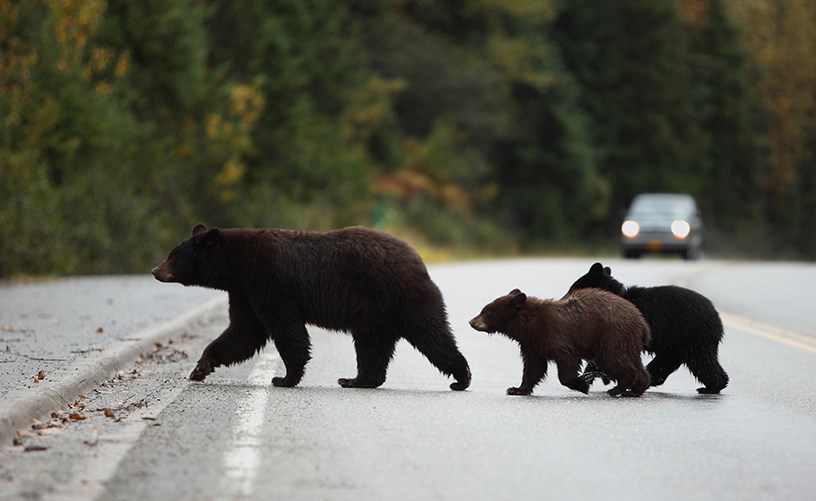A local non-profit has been trying to reduce conflict between human and bears in Prince George for decades; however, the city continues to be ranked as the deadliest community in the province for black bears.
“It is definitely frustrating for us that we've been pushing the same message, we've been working for the same goal for two decades, and we have not seen enough change from the residents and the city,” said Lisa, a board member with the Northern Bear Awareness Society.
Prince George was recently named the deadliest community in B.C. for black bears in 2022.
That’s according to data obtained through a Freedom of Information request and compiled by wildlife protection charity The Fur-Bearer.
In Prince George, 32 black bears were killed in 2022, which is the most bears killed out of any city in the province.
The city has been the top ranked in B.C. by the number of black bears killed by the BC Conservation Officer Service (BCCOS) from 2015 to 2022 with 263 bear deaths.
“It's complicated, obviously. But part of [the problem] is residents are not making enough effort to secure their attractants mostly being garbage, but that also includes fruit trees, and compost and bird feeders,” said Lisa.
“We all need to make a step up on our efforts and that can be as simple as putting a ratchet strap on your garbage can if you don't have a shed or garage.”
She said another part of the problem is the lack of support from the city regarding reaching Bear Smart status.
The Bear Smart Community Program is a voluntary, preventative conservation measure that encourages communities, businesses and individuals to address the root causes of human-bear conflicts.
“We were working towards that. But then when COVID hit all of the funding was removed and no funding has been reallocated yet,” added Lisa.
“The support that we had has kind of diminished. It has been left to us as volunteers to organize the paid city employees and paid conservation officers to get together and meet and discuss what we can do to get to this.”
She said they are grateful for the support they are getting from the organizations but it’s not enough to reach Bear Smart status.
Bear Resistant Garbage Cans
Lisa added the biggest hurdle to becoming a Bear Smart community is the cost of getting bear-resistant garbage cans.
“They are a huge cost and we are a big city so other communities that have reached their smart status are not nearly as large as we are,” she said.
The city conducted a three-year pilot program, which provided 300 bear resistant garbage cans to a neighbourhood in the Hart Highlands in early 2019.
Results of the pilot project, after the three-year duration, indicate that eight per cent of the garbage cans had failures with the locking latch mechanism especially in the winter months.The city said that debris would also accumulate in the latches and render them inoperable year-round.
The city decided not to extend the pilot program and noted the bear resistant garbage cans were five times the cost of a regular can.
“I would say it was not a failure,” said Lisa of the pilot program. “If the view is that it was to reduce human bear interactions and to reduce bears from coming into the neighbourhood and accessing garbage then it was a success.”
She agreed it was not a success in that the specific can used had issues with the locking mechanism in the wintertime which caused inconvenience and safety issues for the drivers.
“Was it success successful in its ease of use? Not so much. But it would be lovely if the city would fund at least research into a more appropriate can for our climate and our waste management system.”
The city has approx. 25,000 automated garbage cans and in order to replace them all with bear-resistant cans would cost an estimated $7 million of taxpayers money.
The city says staff are continuing to explore other bear resistant options for the automated garbage cans that might be better suited for the weather conditions in Prince George and it is still part of the the interagency working group which resumed meetings in 2022.
"Achieving Provincial Bear Smart status is still something the City hopes for, but it is important to find the right solutions that are an effective use of both money and resources," said a city spokesperson.
However, Lisa also noted it’s the residents themselves that need to shift their mentality.
“Even if we have bear resistant garbage cans, there's still the fruit trees that need to be picked regularly and early, there's still the bird feeders that need to come down, there's still the compost that needs to be turned regularly and managed properly.”
She said it’s been difficult as a non-profit run by part-time volunteers to raise awareness and educate the public about reducing human-bear conflicts.
“I don't know what it's going to take to get people on board. I'm hoping that about hearing reports like this strike a chord with people because it's so sad, and it's so unnecessary and so preventable.”
This article has been updated to add comment from the City of Prince George.



